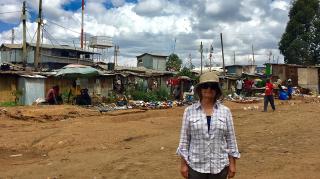Empowering youth in Kenya and at home


It's a once-in-a-lifetime opportunity for students—and a yearly experience for Colleen Poeta. As program coordinator of the Sauder Social Entrepreneurship-Kenya (SSE-K) Program, Colleen spends four weeks of her summers in Nairobi, where she supports a team of UBC students as they deliver a series of workshops in the large urban slums of Kibera and Mathare.
First launched in 2006 by Sauder professor Nancy Langdon, the SSE-Kenya program is open to Nairobi residents aged 18-35 who want to develop a business idea. After participating in 10 workshops on topics such as marketing, finance and accounting, each Kenyan participant leaves the program with a business plan in hand and a certificate of completion.
Successful graduates include Dorcas Njoici Gachege, who completed the program in 2014. She opened a highly successful lunch kiosk in Mathare in 2015 that employs 10 people and serves up to 300 customers a day. Another graduate from that same year, Rosslyn Penez Odipe, operates a popular second-hand clothing shop boutique in the Nairobi suburb of Dandera.
This summer marks Colleen's third visit to Kenya since 2015, when she was hired to handle the logistics of running the program. “I usually go a few days ahead of time to make sure that the lodgings we booked are ready to accommodate a group of young and energetic people,” she explains. “We make sure our regular drivers are hired, contracts signed, and all other logistics in place, because security is very high on our list of must-haves. We all stay in the same apartment complex, and our trusted and long-standing drivers come each morning, pick up the students, and take them to their respective teaching areas. At the end of the day the drives will take the students grocery shopping, or complete other daily living tasks, because we prepare a lot of meals in the apartments together.”
Along with Colleen, students are joined part of the time by SSE-Kenya's program director Frances Chandler and academic director Tom Ross. A handful of students from Nairobi's Strathmore University are also hired to help facilitate and translate discussions with workshop participants. As for Colleen's role, since she is the mother of two daughters who are currently studying at UBC, she is the first to admit that her position could well be subtitled Mom Away From Home.
“That's what I am, I'm a mom!” she laughs. “Sometimes the UBC students get sick in the middle of the night and I'll check on them, get them medicine, and generally comfort them as they are so far away from home. I make sure they feel comfortable, safe and secure. On-call 24 hours a day, I'm their mom away from home. Although I am exhausted when I get back, it is one of the most gratifying jobs I have ever had.”
Having lived and travelled around the globe throughout her life, Colleen says the culture shock of travelling to Nairobi isn't that jarring for her. Her husband is a gold miner whose career lead to their family living in the Ghanaian bush for seven years in the 1990s. “We saw a lot of poisonous snakes, monkeys, and other flora and fauna, but not too many people,” she recalls, whimsically. “I also lived in Australia for a year and I backpacked through India when I was 20, so I've seen a lot of poverty.”
One of the most rewarding aspects of her job, she says, is opening the UBC students' eyes to how people in other parts of the world live. The 16 students headed to Kenya this summer will mark the largest contingent taking part in the program yet. “The biggest reward for me is watching the students grow as they mature literally in front of my eyes during this short period away from their familiar surroundings,” Colleen relates. “The first day, they're shocked when they enter these impoverished communities because most of them have never seen this level of squalor. There is minimal or no electricity, running water, sewage system, or toilets. As the first week rolls into the second, they gain self-confidence, an appreciation of the experience, and a growing love of the Kenyan people and culture.”
A recent survey of past participants found that the majority of them remain in contact with one another and with the UBC students who facilitated their workshops. Colleen says she has also developed some long-lasting international friendships, particularly with the program's driver, Fred Mouti. “He has been our security guard, our tour guide and our go-to guy in general for the past 10 years. We all trust and love him, his family, and the employees he hires each year,” she says. As for the SSE-Kenya students, they continue to treat her like a second mom when back at home, regularly popping by her office for impromptu chats and inviting her to get-togethers.
By the time they return home, says Colleen, the students have accomplished more than they ever thought they were capable of and made long-lasting friendships with each other and Kenyans. “Planning lessons, meals and trips, and thinking about how they interact with their peers provides them with the opportunity and skills to overcome their initial discomfort,” Colleen explains. “In the end they appreciate their life, relish the overwhelming feeling of accomplishment, and come back to Canada with a renewed set of friends, skills, and experiences.”
The biggest reward for me is watching the students grow as they mature literally in front of my eyes during this short period away from their familiar surroundings
Colleen Poeta
Find the latest news, updates, events, and useful dates from across UBC, curated for faculty and staff by Internal Communications.
Access a library of resources from multiple UBC websites, all in one place.